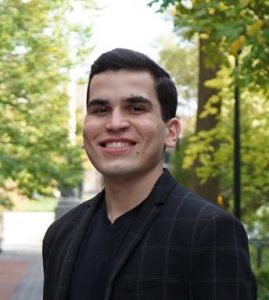About Our Students
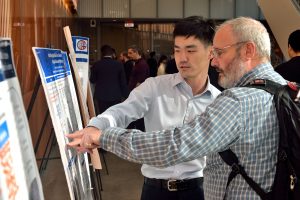 Students who choose Chemical and Biomolecular Engineering come to Penn eager to tackle real-world problems. They relish the challenges posed by math, chemistry, physics, and the biological sciences.
Students who choose Chemical and Biomolecular Engineering come to Penn eager to tackle real-world problems. They relish the challenges posed by math, chemistry, physics, and the biological sciences.
A major in chemical and biomolecular engineering opens a wide range of opportunities. The Chemical and Biomolecular Engineering program teaches them to think across length scales that span from the molecular to the macroscopic. It enables them to move from studying chemical reactions at the nanoscale to designing industrial plants. Our graduates may move on to discover a unique molecular reaction in a cell, or they may develop a method to deliver a drug to that cell. Both our undergraduate and graduate students are uniquely positioned to influence the worlds of business, medicine, industry, and the environment and to advance to the highest levels of research and academia.
Undergraduate Student Spotlights
Student Conference Spotlight
The 2023 AlChE Conference was attended by VIPER CBE Students Colby Snyder and Lorenzo Galang. These students presented their summer research to the AlChE Undergraduate Student Poster Competition.
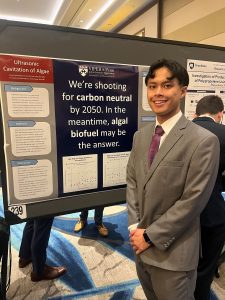
Lorenzo Galang
Poster Title: Ultrasonic Cavitation of Algae
Abstract: Utilizing biofuels limits carbon emissions in the short term as the world works towards transitioning to clean energy sources. Biofuels can be used in existing fossil fuel infrastructure with minimal alteration, replacing natural gas with syngas and gasoline with ethanol. A particularly promising source of biofuels is algae, which only require ponds to grow and do not compete with food crops. Current extraction methods are energy intensive and expensive, counteracting the neutral carbon footprint of biofuels. Ultrasonic cavitation, the creation of small bubbles that pop violently using ultrasonic waves, is potentially cheaper and more energy efficient. Many phenomena associated with cavitation are conducive to extraction, including shearing forces from jetting, high temperatures, creation of free radicals, and collection by bubbling. To quantify the effect of these phenomena and assess the potential of this process for extraction of algal biofuel, a rapid lipid quantification method is necessary, especially when investigating process variables on the macroscopic scale. Current methods limit data collection, and fluorescent lipid dyes present an opportunity for rapid quantification through spectrophotometry. Several combinations of dyes and solvents were tested, as well as various infiltration times. Water, algal oil, live algae, and algae washed with an established method were compared to assess the correlation between the fluorescence and lysis of algae.
Session: Fuels, Petrochemicals, and Energy
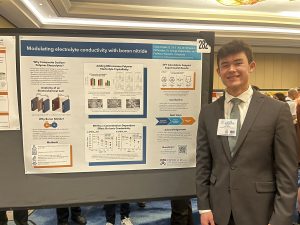
Colby Snyder
Poster Title: Hexagonal Boron Nitride Modulates Crystallinity and Charge Mobility in PEO–NaNO3 Electrolytes
Colby A. Snyder, Shreyas S. Pathreeker, George Papamokos, Russell J. Composto
Abstract: Composite polymer electrolytes (CPEs) hold great promise for the development of safe and sustainable batteries. In this study, we find that 2D hexagonal boron nitride (h-BN) has a non-monotonic effect on polymer crystallinity and total ionic conductivity in PEO-NaNO3 electrolytes. The dual Lewis acidity and basicity of h-BN allow it to interact with dissociated salt ions and the polymer matrix itself. PEO crystallinity was quantified using differential scanning calorimetry (DSC) and X-ray diffraction (XRD), and complex formation between NaNO3, PEO, and h-BN was studied using IR spectroscopy. Total ionic conductivity was determined using electrochemical impedance spectroscopy (EIS) as a function of temperature. We find that h-BN has two competing effects on polymer crystallinity and charge mobility in CPEs: 1) nucleation-enhanced crystallization of PEO on h-BN surfaces at low h-BN loading, and 2) spherulitic confinement of PEO at higher h-BN weight loading. DFT calculations confirm strong attractive interactions between h-BN and both free ions (Na+ and NO3-), and we also find lesser attractive interactions between h-BN and PEO. These new findings for Na-polymer electrolytes support our experimental results. Our findings highlight the importance of filler geometry and chemical characteristics in designing CPEs for Na-ion batteries.
Session: Materials Engineering and Sciences
Poster Competition
Presenting our research from the summer was fulfilling and rewarding. We learned a lot from presenting to people with experience in our fields. Scientific communication is a key skill for successful research, and this experience helped hone our skills in presenting to multiple expert judges. In addition, we received many helpful suggestions for our research, even including a specific solvent to solve one of our research problems.
Competition Exposure
One of the key aspects of engineering is teamwork, especially under tight constraints that require creative solutions. At this year’s AIChE Undergraduate Conference, we learned about several valuable team-based competitions that we could complement in our CBE classes and existing Chem-E Car team. The competitions offered (other than Chem-E Car) include Jeopardy, Chem-E Cube, and Chem-E Sports. Jeopardy is a trivia competition, Chem-E Cube is a production of a 1 cubic foot plant to solve a problem statement (this year, students worked on direct air capture devices), and Chem-E Sports poses an industry-relevant process design challenge. Engaging with any of these competitions could provide underclassmen with hands-on exposure to the applications of CBE before they reach their upper-level classes. It will also help foster community within the class and build teamwork and engineering skills that will be invaluable when pursuing a career. Speaking to the other teams, exchanging ideas, following their problem-solving processes, and observing their results was enlightening and a great way to meet other chemical engineers. Raising teams for these events and sending them to compete has untapped value and offers a unique, enriching experience.
Career Paths
Over the course of the weekend, we met people who had taken every path imaginable within CBE. We spent hours talking to professors about their graduate programs and research, met recruiters, project managers, and other industry engineers, and we made several professional connections. The workshops we attended featured process engineers, entrepreneurs, and managers from Chevron who spoke about their decades of experience, and engineers from Evonik who explained how to create and quantify value as a chemical engineer. We also spoke with the lecturers after their workshops, following up on their work and receiving more personal advice; and connected with engineers from large companies such as Merck. This intimate look at industry engineering offered a new perspective on what our CBE curriculum is preparing us for. It helped us to envision what our own futures might look like and how we could apply the skills that we are learning now.
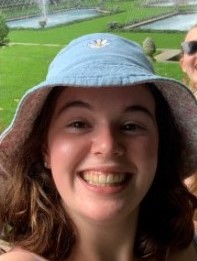
Undergraduate Spotlight
Kara Murphy
Chemical and Biomolecular Engineering
Class of 2024
Hometown: Kennett Square, PA
Why did you choose to pursue engineering? Why CBE?
I’ve wanted to pursue a career in science since I was very young, and I ultimately decided on engineering because I could be doing science with my own hands. I enjoy the hands-on aspect of engineering and how it feels like you, personally, are having an effect on the world. I specifically chose CBE because chemistry is my favorite science and the degree is very versatile and relevant.
What are your areas of interest within CBE?
I am interested in both medical and environmental research within CBE.
Have you had any internships or worked in a research lab? If so, where? Do you have any advice for other CBE students interested in doing the same?
I worked in a lab this past summer which investigated the microenvironment of breast cancer tumors. I specifically looked at the interaction of two specific proteins and how to augment this interaction to suppress tumor functions. My best advice is to first find an area of research interest to narrow down your search, and then reach out to as many professors as possible.
What do you hope to do after graduation?
I would like to do research on either medical or environmental topics. Some of my specific interests include cancer, stem cells, energy, and carbon capture.
Where is your favorite spot on campus?
Platt Student Performing Arts House
Learn more about the BSE in Chemical and Biomolecular Engineering.
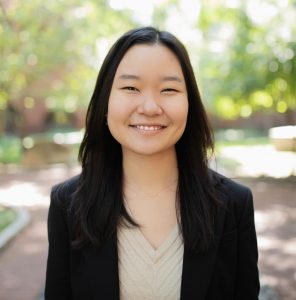 Research Spotlight
Research Spotlight
Emily Kim
Chemical and Biomolecular Engineering
Class of 2024
Hometown: Duluth, GA
Programs:
CBE Major
Clark Scholars
Jack Kent Cooke
Research Conducted: Summer ’21-present
Principal Investigator: Michael Mitchell
Mentor: Rebecca Haley & Marshall Padilla
Research Project:
Lipid nanoparticles (LNPs) are often used to deliver protein and nucleic acid therapeutics. They are composed of cholesterol, a phospholipid, a PEGylated lipid, and an ionizable lipid (IL) (one of the most important molecules for delivery). Traditional ILs are expensive due to their synthetic complexity. We are proposing to replace traditional ILs with L-lysine-derivatized polymers. By using poly-L-lysine as the backbone, we can append a wide array of functional groups, which increases the synthetic diversity of the polymer. This can be accomplished using two simple synthetic steps, allowing for a diverse library of polymers to be synthesized with relative ease. The objective of the project is to formulate small and customizable ionizable polymers to use as substitutes for traditional ionizable lipids. These ionizable lipids will be synthesized and formulated into LNPs. They will then be tested for potential enhancement of protein and nucleic acid delivery.
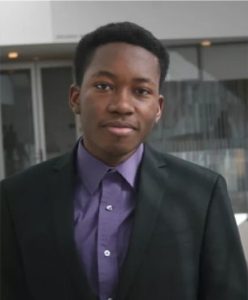
International Student Spotlight
Kofi Nightingale
Chemical and Biomolecular Engineering
Class of 2023
Hometown: Kingston, Jamaica
Programs:
CBE Major
Engineering Entrepreneurship Minor
Why did you choose to pursue engineering? Why CBE?
I chose to pursue engineering mainly because of the essential skills studying engineering allows you to develop such as critical and analytical thinking in different environments. I chose CBE in particular due to my love for biochemistry and the molecular complexities underlying living organisms. As such, it seemed like the best fit for me here at Penn.
What are your areas of interest within CBE?
My primary area of interest currently is within the pharmaceutical and medical technology industry. I chose CBE as a way to impact the medicinal field through the lens of the individuals on the cutting-edge of medicinal science with the chance of someday being a part of that innovation pipeline.
Have you had any internships or worked in a research lab? If so, where? Do you have any advice for other CBE students interested in doing the same?
I have worked in the Lim Lab within the CBE department where I worked on investigating the factors affecting the elongation rate of RNA Polymerase II, the primary enzyme responsible for gene transcription in most living organisms. This could have many implications in the field of genetic diagnostics and gene therapy further down the line.
My best advice for other CBE students interested in research would be to begin to build a rapport with a professor on campus. An easy place to start would be with the professors that teach you but if your interest lies outside of that then do not hesitate to reach out (cold emailing is tough but the best way to get your foot in the door) or explore many opportunities provided the University such as the PURM program or other CURF opportunities. As long as you present yourself as someone highly interested in the work they do and have done your homework in finding out more about what they do in the lab, you’ll be setting yourself up for success in landing that research opportunity.
Where is your favorite spot on campus?
One of my favorite spots on campus would have to be the Education Commons or the newly renovated Biotech Commons, but the Singh Center for Nanotechnology still blows me away.
VIPER Student Spotlight
Sean Deresh
Chemical and Biomolecular Engineering
Class of 2023
Hometown: Guaynabo, Puerto Rico
Programs:
VIPER
CBE Major
Earth Science Major
Research Conducted: Fall 21 – Spring 22
Principal Investigator: Dr. John Vohs
Research Project:
The growing concern for global climate change and finite energy resources have generated interest in the transformation of biomass carbohydrates to fuels and chemicals.
Catalytic active metal oxides with high surface area are highly desired for application in the catalysis of such transformations. These catalysts have proven to show promise in crucial biomass reactions such as dehydrations and condensations. Our goal is to synthesize and characterize a uniformly dispersed metal oxide thin film with high surface area for application in catalytic reactions. Atomic Layer Deposition is being used in order to conduct the synthesis of the thin film in an atomic scale. The self-limiting nature of this technique allows for a precise control of the growth of the thin film, progressing from each layer to the next, all the while maintaining a high surface area. By depositing metal precursors on Mesoporous silica in multiple deposition cycles, we can precisely show the pore size and control the active site for catalysis application.
Graduate Student Spotlight
 Accelerated Masters Spotlight
Accelerated Masters Spotlight
Madeline Maurer
Chemical and Biomolecular Engineering
Class of 2025
Hometown: Atlanta, GA
Where did you receive your undergraduate degree?
University of Pennsylvania, May 2025
Why did you choose CBE at Penn?
What made you interested in chemical engineering?
What was your favorite CBE class and why?
My favorite class is CBE 5150, Chemical Product Design. The class covers the study of chemical products designed for chemical, biochemical, pharmaceutical, cosmetic, electronic, agrochemical, and similar industries from the perspective of designing and manufacturing consumer and industrial products with a market demand. Dr. Seider’s lectures provide insight into the practical application of chemical engineering into the business environment. It is also fascinating when Dr. Seider talks about his many years teaching at UPenn, highlighting the history experienced on our campus.
What are your future plans and how do you plan to use your degree?
Have you been involved with research or have you done an internship? Tell me more!
What do you enjoy in your spare time?
Tell us something interesting or unusual that readers may like to know about you.
Masters Internship Spotlight
Ramanathan Ganesan
Chemical and Biomolecular Engineering
Class of 2024
Internship:
The Philadelphia Water Department
My journey into the realm of water system operations and management began as a Masters student pursuing Chemical and Biomolecular Engineering at the University of Pennsylvania, driven by a passion for addressing challenges in the water sector sustainably. Throughout my academic coursework, I gained a foundational understanding of unit processes and operations in water treatment plants and worked on developing a sustainable method to use coal ash in the filtration treatment of domestic wastewater. However, I yearned to deepen my knowledge in hydraulic network design and water distribution systems—an aspiration that led me to embark on a journey to join as a Co-op at the Philadelphia Water Department.
During my six-month co-op experience at the Philadelphia Water Department, I was immersed in a dynamic and enriching environment that significantly shaped my professional growth and career aspirations. The experience provided me with hands-on exposure to various facets of water system management, from critical infrastructure operations to advanced software applications pivotal in modern water engineering.
One of the most enlightening aspects of my co-op was the practical engagement with hydrant systems. I delved into the intricacies of different hydrant types essential for firefighting and water distribution, conducting flow tests under expert supervision to analyze pressure dynamics across diverse altitudes. This experience not only honed my technical skills but also instilled in me a profound appreciation for operational efficiency within water systems.
Moreover, my co-op allowed me to explore the critical domain of water quality assessment. Through laboratory techniques, I acquired comprehensive insights into assessing drinking water quality and understanding vital parameters crucial for ensuring water safety and compliance with stringent quality standards—an essential foundation for sustainable water management.
Additionally, I also had intensive training in software applications like ArcGIS, InfoWater, and AutoCAD. I gained proficiency in mapping and analyzing spatial data using ArcGIS, enabling effective visualization and interpretation of geographical water system data. InfoWater training empowered me to model and simulate water distribution systems, fostering a deeper understanding of system behavior and performance dynamics—an invaluable skill set for optimizing water infrastructure management.
Collaborating on field projects further enriched my experience. I actively contributed to more than 20+ fire flow tests, transmission main disinfections, and investigations into low-pressure scenarios, leveraging my newfound expertise in ArcGIS and InfoWater to streamline water hydraulic network execution. Utilizing AutoCAD, I played a role in designing essential components of the water distribution system, including pumps and valves.
This experience has not only fortified my technical knowledge but has also reinstated my commitment and passion to the field of water. The invaluable exposure and skills acquired during my tenure at the Philadelphia Water Department have laid a robust foundation for my future endeavors, fueling my aspiration to play a managerial role in pioneering sustainable water projects that address pressing environmental challenges.
In conclusion, my co-op at the Philadelphia Water Department has played a key role in shaping my professional journey, equipping me with practical insights and skills that I am eager to apply and share within academic and professional circles. This experience has been transformative, deepening my passion for sustainable water management and fortifying my resolve to make a positive impact in this field.
 Masters Internship Spotlight
Masters Internship Spotlight
Sai Narender Sakhamudi
Chemical and Biomolecular Engineering
Class of 2024
Internship:
Tesla
During the summer and fall of 2023, I had the privilege of interning at Tesla’s Fremont, California facility as a part of the Cell Cathode Engineering Team. My projects were focused on the development, troubleshooting, optimization, and scale-up of novel, high-energy cathode active materials for battery electric vehicles.
The foundational engineering principles acquired through coursework, coupled with my understanding of material behavior and characterization experience gained from research lab works, were instrumental in securing this internship and proved invaluable in tackling my projects at Tesla.
This internship provided me with a valuable opportunity to engage in both development and manufacturing environments, fostering cross-functional collaboration with various teams. Through this experience, I honed my engineering problem-solving skills and cultivated a strong sense of teamwork.
I am deeply appreciative of the mentorship I received, which enabled me to make tangible contributions toward Tesla’s mission of accelerating sustainability worldwide. My passion for sustainability, combined with the impactful internship experience, has further fueled my desire to pursue a career in battery technology.
Ph.D. Spotlight
Max Pisciotta
Chemical and Biomolecular Engineering
Class of 2024
Where did you receive your undergraduate degree?
Colorado School of Mines
Who is your current advising professor?
Dr. Jennifer Wilcox and Dr. Peter Psarras
What made you interested in chemical engineering?
What is your specific field of interest/research?
I work primarily in carbon capture and carbon removal.
Why did you choose CBE at Penn?
I chose CBE at Penn because I was interested to work with Dr. Wilcox and also get a different perspective on climate change mitigation technologies through her collaborations with the Kleinman Center for Energy Policy.
What are your future plans and how do you plan to use your Ph.D.?
I plan to use my Ph.D. to continue to develop and evaluate processes that result in carbon dioxide emissions reductions and removals to ensure that we can meet climate goals.
What do you enjoy in your spare time?
I enjoy running, baking, and reading.
Tell us something interesting or unusual that readers may like to know about you.
I’m involved with LGBTQ+ advocacy on campus!
 Ph.D. Spotlight
Ph.D. Spotlight
Kaushik Shankar
Chemical and Biomolecular Engineering
Class of 2023
Hometown: Chennai, a city in the southernmost State of Tamil Nadu, India
Where did you receive your undergraduate degree?
I received my undergraduate degree in Chemical Engineering from the Indian Institute of Technology Bombay.
Who is your current advising professor?
I am co-advised by Drs. Scott Diamond and Talid Sinno.
What made you interested in chemical engineering?
I was amazed by the widespread applicability of chemical engineering fundamentals. It equips one with the skillset to address solutions to a variety of problems, be it in human health, environment, or energy, among several others.
What is your specific field of interest/research?
My research is in the area of blood systems biology. More specifically, I am working toward developing a multiscale mathematical model to simulate platelet aggregation and deposition underflow. This would be useful in studying patient-specific blood function and thrombotic risk.
Why did you choose CBE at Penn?
I was greatly impressed by the CBE faculty at Penn, as well as their research program, which is highly interdisciplinary. Moreover, I wanted to work on something that would impact human health in some way, which made Penn an easy choice for me.
What are your future plans and how do you plan to use your Ph.D.?
I do not have a definite answer to this question. At the moment, I am leaning toward a career in academia, as I believe it would constantly challenge and enhance both my intellectual and creative abilities.
What do you enjoy in your spare time?
I enjoy watching sports in general, especially cricket and tennis. I also like watching movies and TV, and reading novels, especially fiction.
Tell us something interesting or unusual that readers may like to know about you.
I never originally envisioned myself majoring in engineering. I wanted to pursue commerce and economics in high school but ended up taking science and math, primarily due to peer pressure. I found the going quite tough and was regretful until I started appreciating its ingenuity, and it has been a fascinating journey since.
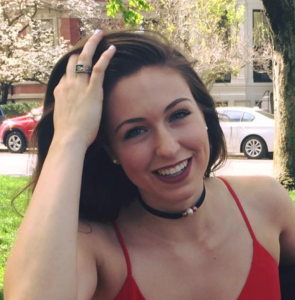 Ph.D. Spotlight
Ph.D. Spotlight
Anastasia Neuman
Chemical and Biomolecular Engineering
Class of 2024
Hometown: Abingdon, Maryland
Where did you receive your undergraduate degree?
I received my undergraduate degree in Chemical and Biological Engineering from MIT.
Who is your current advising professor?
I am co-advised by Drs. Daeyeon Lee and Rob Riggleman.
What made you interested in chemical engineering?
I became interested while working at the US Army Medical Research Institute for Chemical Defense in high school, studying bioscavengers for nerve agents.
What is your specific field of interest/research?
My research is in thermodynamics and transport phenomena in polymer nanocomposites under extreme nanoconfinement.
Why did you choose CBE at Penn?
I chose CBE at Penn because the faculty does interesting work, they are very friendly and supportive, and the location is great!
What are your future plans and how do you plan to use your Ph.D.?
My goal is to go into academia.
What do you enjoy in your spare time?
I love field hockey (I play for the club team at Penn and in local adult leagues), cooking, traveling (when I can find cheap flights), and exploring local beers gardens!
Tell us something interesting or unusual that readers may like to know about you.
I’m a bit of an adrenaline junkie and I have sky-dived and bungee jumped into the Nile.
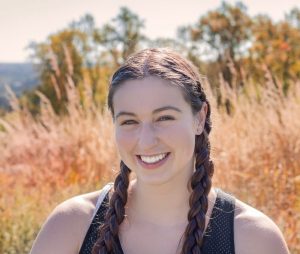 Anastasia Neuman, Named a Pl on an XSEDE Grant
Anastasia Neuman, Named a Pl on an XSEDE Grant
Anastasia Neuman, a CBE Ph.D. candidate in Dr. Riggleman’s Computational Soft Matter Lab has been named a Pl on an XSEDE Grant. Anastasia grew up in Maryland and received her undergraduate degree in Chemical and Biological Engineering from MIT. Her research is currently focused on thermodynamics and transport phenomena in polymer nanocomposites under extreme nanoconfinement. The Extreme Science and Engineering Discovery Environment (XSEDE) is a single virtual system that scientists can use to interactively share computing resources, data and expertise. The XSEDE startup allocation request made by Neuman was to investigate the dynamics of highly-filled polymer nanocomposite systems in which phase separation is inhibited. They also aimed to understand how confinement alters the gas transport properties of these composites, as polymer nanocomposites are highly sought out for barrier and transport applications.





